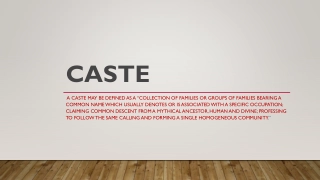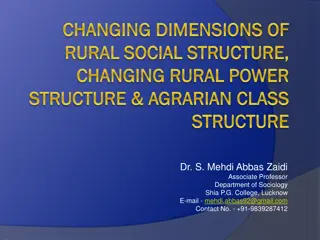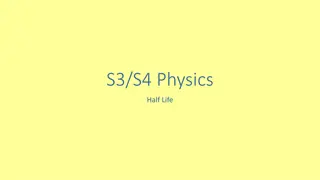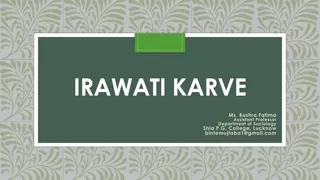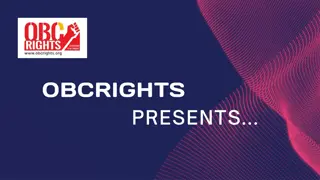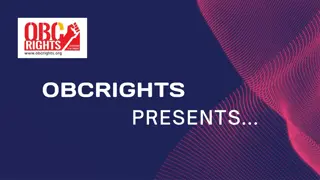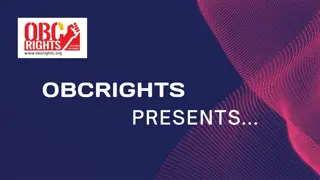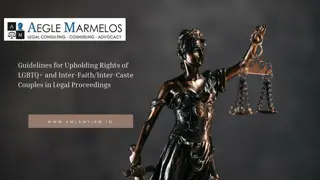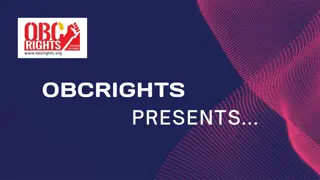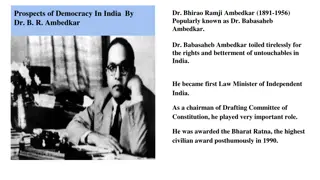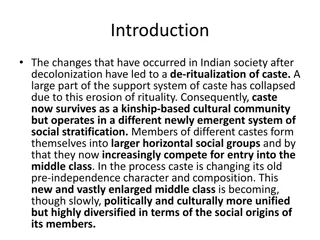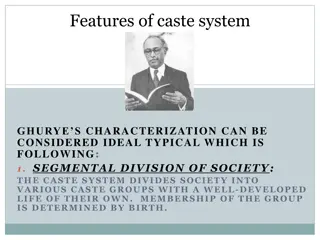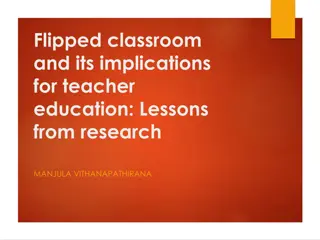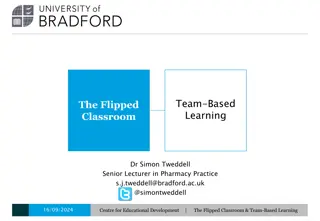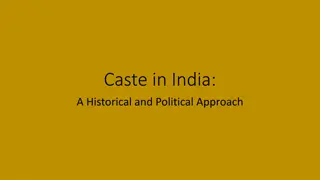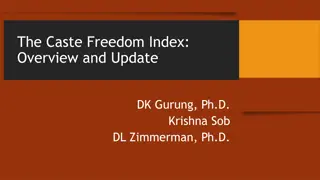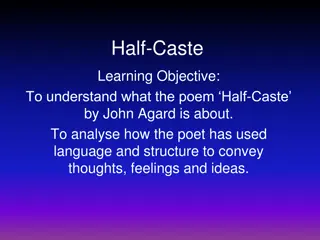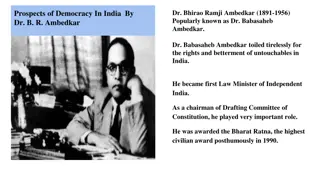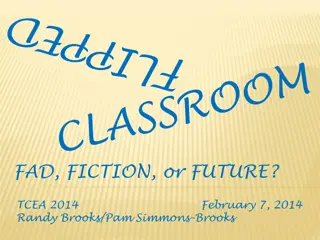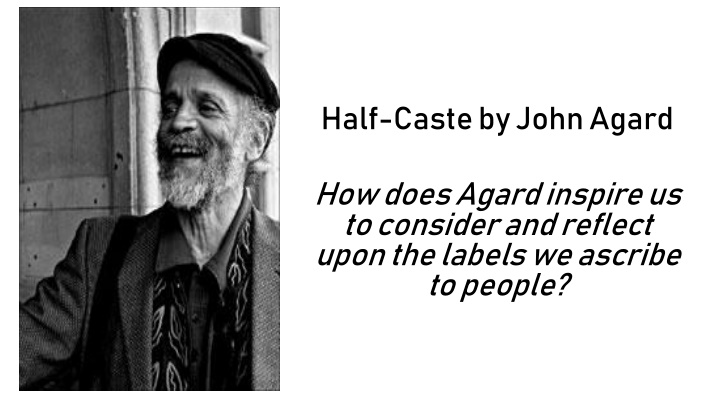
Inspiring Reflection on Labels in "Half-Caste" by John Agard
Explore how John Agard prompts us to reconsider the labels we assign to individuals in his thought-provoking poem "Half-Caste." Agard's personal background and creative expressions challenge us to reflect on the impact of such categorizations on people.
Download Presentation

Please find below an Image/Link to download the presentation.
The content on the website is provided AS IS for your information and personal use only. It may not be sold, licensed, or shared on other websites without obtaining consent from the author. If you encounter any issues during the download, it is possible that the publisher has removed the file from their server.
You are allowed to download the files provided on this website for personal or commercial use, subject to the condition that they are used lawfully. All files are the property of their respective owners.
The content on the website is provided AS IS for your information and personal use only. It may not be sold, licensed, or shared on other websites without obtaining consent from the author.
E N D
Presentation Transcript
Half-Caste by John Agard How does Agardinspire us to consider and reflect upon the labels we ascribe to people?
John Agard Agard was born in what is now Guyana in 1949. Agard s father is from the Caribbean, while his mother is Portugese. Meaning he is mixed-race. This is probably his main inspiration for writing the poem. Agard started his writing career as a journalist in Guyana. He moved to England in the late 1970s and became a lecturer of Caribbean culture. It was here that he first encountered the racist word half- caste , which angered him. He has won various awards for his children s books and poetry throughout his career, and in 1993, he became the Poet in Residence at the BBC in London. Agard continues to write and publish his works today. (Revision notes JP)
Half-Caste by JohnAgard 31 32 33 34 35 36 37 38 39 40 41 42 43 44 45 46 47 48 49 50 Explain yuself whayumean Ah listening to you widde keen half of mihear Ah lookinat yuwidde keen half of miheye and when I m introduced to yu I m sure you ll understand why I offer yuhalf-a-hand an when I sleep at night I close half-a-eye consequently when I dream I dream half-a-dream snwhen moon begin to glow I half-caste human being cast half-a-shadow but yumust come back tomorrow widde whole of yueye an de whole of yuear an de whole of yumind 1 2 3 Excuse me Standing on one leg I m half-caste 4 5 6 7 8 9 10 11 12 13 14 15 16 17 18 19 20 21 22 23 24 25 26 27 28 29 30 Explain yuself whayumean when you say half-caste yumean when Picasso mix red an green is a half-caste canvas / explain yuself whayumean when yusay half-caste yumean when light an shadow mix in de sky is a half-caste weather / well in datcase englandweather nearly always half-caste in fact some o demcloud half-caste till demovercast so spiteful demdon t want de sun pass ah rass/ explain yuself whayumean when you say half-caste yumean Tchaikovsky sit down at dah piano an mix a black key wida white key is a half-caste symphony / 51 52 an I will tell yu de other half of my story.
How does Agard inspire us to consider and reflect upon the labels we ascribe to people?
If someone or something inspires you to do something new or unusual, they make you want to do it. How does Agard inspire us to consider and reflect upon the labels we ascribe to people? If you say that someone or something is labelled as a particular thing, you mean that people generally describe them that way and you think that this is unfair.
1. Firstly, there is a confrontational tone. Verb phrase: standing on one leg humourous towards sarcastic tone to illustrate a point about being considered half a person. Apologetic tone: Excuse me as though he is apologizing for who he is as a mixed race human being. Immediate response to something he has heard. Although seemingly apologetic, he is not. He is angry and wants to confront the unfair labelling he receives. 1 2 3 Excuse me standing on one leg I m half-caste Noun phrase: half-caste Noun caste is associated with the word purity Half-caste suggestion of someone who is impure
1. Firstly, there is a confrontational tone. Dialect: yuself, wha, yu Proud of cultural heritage and dialect and uses as someone who is comfortable with his own identity Imperative: Explain Agard wants answers and wants to understand why the label is necessary or appropriate. It s a challenge 4 5 6 Explain yuself Wha yu mean When yu say half-caste Refrain: Explain yuself a phrase or line that is repeated across a poem. Adds to confrontational / accusatory tone wanting answers, seeking clarification of meaning Relentless demand for the poet to justify their use of offensive term. Noun phrase: half-caste
2. The poet provides examples of the beauty of compositions. Example 2 / Metaphor: The sky mixing of light and dark to create beautiful weather are they considered half-caste? Also this weather is frequent in England showing its typicality just as it is typical / normal to be of mixed race When Picasso mix red an green is a half-caste canvas 7 8 9 Example / Metaphor: Picasso mixing of colours to create beautiful paintings are they considered half-caste? 13 14 15 when light an shadow mix in de sky is a half-caste weather Proper nouns: Picasso and Tchaikovsky geniuses within their field who are expert at blending elements 26 27 28 29 30 Example 3 / Metaphor: Tchaikovsky mixing of keys the black and white - are they considered half- caste? when Tchaikovsky sit down at dah piano an mix a black key wid a white key is a half-caste symphony
3. The poet indirectly attacks the use of the term half-caste as a way of suggesting he is, therefore, considered half a person. Extended metaphor through noun phrase: keen half / mih ear Explain yuself Wha yu mean Ah listening to yu wid de Keen half of mih ear Ah lookin at yu wid de keen Half of mih eye And when I m introduced to yu I m sure you ll understand Why I offer yu half-a-hand An when I sleep at night I close half a eye Consequently when I dream I dream half-a-dream An when moon begin to glow I half-caste human being Cast half-a-shadow 31 32 33 34 35 36 37 38 39 40 41 42 43 44 45 46 Imperative refrain: Explain yuself becomes more demanding as the poem continues. Wants answers + justification for the use of the term keen half / mih eye half-a-hand half a eye half-a-dream Noun phrase: half-a- shadow point being - full human being no lesser or no inferior. list of actions the poet completes using only half of himself because the intimation through the use of half-caste is that he is half of a person. The repetition of such a structure emphasises how offended he is by the term and the thought that he is perceived as half of a person. Verb phrases: looking at yu / introduced to yu / offer yu the listener is now under interrogation
4. The poet challenges the listener to come back when he is opened his mind and considered his use of language Adjective: whole juxtaposition of whole versus half implication that it is the listener who is not whole because of his prejudices. His mind is narrower and his use of language in appropriate. The poet challenges the listener to open his / her mind and reconsider the label being used. Direct address: yu The poet is now directly addressing the listener to change his / her mindset But yu must come back tomorrow Wid de whole of yu eye An de whole of yu ear An de whole of yu mind 47 48 49 50 Imperative: must The challenge is direct and one of certainty, in that the poet will not accept the term or the listener s attitude. An I will tell yu De other half Of my story 51 52 53 Listing: eye , ear , mind interesting order. Perhaps because we judge first with our eyes esp skin colour which is visual. Our ears second but our mind last in that when they have looked, listened to what the poet has been saying, perhaps then their mind will be open and realise the hurtfulness of the label ascribed. Statement: I will tell yu / De other half / Of my story Implication that his mixed race by no means defines who he is as a person, there is so much more. His race is not his story.
Emotive tone Emotive tone L19: in fact some o dem cloud / half-caste till dem overcast / so spiteful dem don t want de sun pass use of adjective spiteful to connect to racists who use the term in spite. L22: Ah-rass Caribbean way of saying my arse
Form and structure Form and structure Free verse no fixed rhyme scheme or rhythm. It is an emotive poem. No punctuation so enjambment is used throughout rejects convention from which terms like half-caste derive. Phonetic spelling accent of Afro-Caribbean. Agard is proud of his heritage. Also, forces the reader to speak with his voice which helps place us in his shoes.
Half-Caste by John Agard How does Agard inspire us to consider and reflect upon the labels we ascribe to people?

